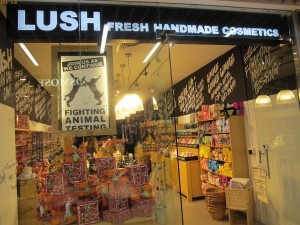Consumers of today are much more socially conscious than they have ever been before. Most consumers are looking for a voice they can trust. Companies that people want to actively support and advocate for must demonstrate that they too have similar and passionate ideologies in order to stand out and strive.
LUSH cosmetics is a perfect example of a company that stands out by heavily stressing the importance of corporate social responsibility. By taking a strong stance within the communities it has businesses in, LUSH has been able to build a brand image known for its code of ethics and attitudes towards the environment. Chief executive Mark Constantine, in backing the company’s brand image, has openly voiced his and LUSH’s support for a campaign that wants to ban all animal testing in Australia.
By looking at the way LUSH has involved itself in its communities, we can clearly distinguish the connections between LUSH’s approach to managing its business to Freeman’s stakeholder theory. LUSH, by researching Australia’s laws on animal testing, has demonstrated that it pays attention to the important issues of corporate responsibility. Just as Freeman talked about businesses that are bad citizens of the community by not acknowledging its effects of civil society, LUSH has done the opposite in order to be one of the first of its kind to advocate of the permanent banning of animal testing in cosmetics.
—
Check out these interesting articles I stumbled upon:
1 – Studying ethics could cause you to act unethical
2 – Business schools teaching ethics
3 – How being ethical can help a company profit

